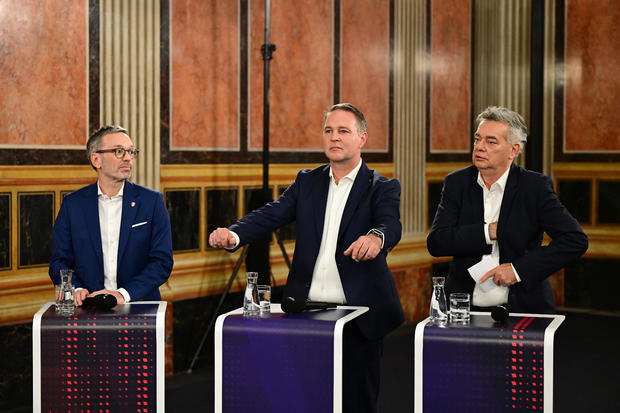
Austria’s far-right Freedom Party heading for its first national election win
Austria’s far-right Freedom Party was headed for its first win in a national parliamentary election on Sunday, finishing ahead of the governing conservatives after tapping into voters’ anxieties about immigration, inflation, Ukraine and other concerns, a projection showed. But its chances of governing were unclear.
A projection for ORF public television, based on counting of more than half the votes, put support for the Freedom Party at 29.2% and Chancellor Karl Nehammer’s Austrian People’s Party at 26.3%. The center-left Social Democrats were in third place with 20.5%.
Herbert Kickl, a former interior minister and longtime campaign strategist who has led the Freedom Party since 2021, wants to become Austria’s new chancellor on the back of the first far-right national election win in post-World War II Austria.
European Parliament election, which also brought gains for other European far-right parties. The party is a long-established political force but Sunday’s projected result, if confirmed, would be its best yet in a national parliamentary election — beating the 26.9% it scored in 1999.
In 2019, its support slumped to 16.2% after a scandal brought down a government in which it was the junior coalition partner. Then-vice chancellor and Freedom Party leader Heinz-Christian Strache resigned following the publication of a secretly recorded video in which he appeared to offer favors to a purported Russian investor.
The leader of the Social Democrats, a party that led many of Austria’s post-World War II governments, positioned himself as the polar opposite of Kickl. Andreas Babler ruled out governing with the far right and has labeled Kickl “a threat to democracy.”
While the Freedom Party has recovered, the popularity of Nehammer’s People’s Party, which currently leads a coalition government with the environmentalist Greens as junior partners, declined sharply compared with 2019. The Greens’ support also was projected to drop to just under 9%, and the outgoing coalition appeared to be well short of a majority.
During the election campaign, Nehammer portrayed his party, which has taken a tough line on immigration in recent years, as “the strong center” that would guarantee stability amid multiple crises.
But those crises, ranging from the COVID-19 pandemic to Russia’s invasion of Ukraine and resulting rising energy prices and inflation, also cost it support. The government also angered many Austrians in 2022 with a short-lived coronavirus vaccine mandate, the first in Europe.
But the recent flooding caused by Storm Boris that hit Austria and other countries in Central Europe brought the environment back into the election debate and may have helped Nehammer slightly narrow the gap.
The People’s Party is the far right’s only way into government.
Nehammer has repeatedly excluded joining a government led by Kickl, describing him as a “security risk” for the country, but hasn’t ruled out a coalition with the Freedom Party in and of itself — which would imply Kickl renouncing a position in government.
The likelihood of Kickl agreeing to such a deal if he wins the election is very low, leading political scientist Peter Filzmaier said before the election.
The most probable alternative would be an alliance between the People’s Party and the Social Democrats — with or without the liberal Neos, who took about 9% of the vote.
Source: cbsnews.com